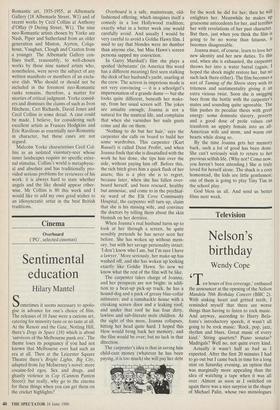Cinema
Overboard (PG', selected cinemas)
Sentimental education
Hilary Mantel
Sometimes it seems necessary to apolo- gise in advance for one's choice of film. The releases of 10 June were a curious set, catering for minority taste or no taste at all. At the Renoir and the Gate, Notting Hill, there's Dogs in Space (18) which is about 'survivors of the Melbourne punk era'. The theme loses its poignancy if you had not known that Melbourne ever had such an era at all. Then at the Leicester Square Theatre there's Bright Lights, Big City, adapted from Jay McInerney's novel: more cocaine-fed egos. Sex and drugs, and ghastly violence in Cop (Cannon Panton Street): but really, why go to the cinema for these things when you can get them on the cricket highlights? Overboard is a safe, mainstream, old- fashioned offering, which imagines itself a comedy in a lost Hollywood tradition; exactly what in a better week one would carefully avoid. And usually I would be very careful to avoid a Goldie Hawn film. I used to say that blondes were no dumber than anyone else, but Miss Hawn's screen persona sapped my conviction.
In Garry Marshall's film she plays a spoiled 'debutante' (in America this word has a different meaning) first seen stalking the deck of her husband's yacht, snarling at the crew. The actress in imperious mode is not very convincing — it is a schoolgirl's impersonation of a grande dame — but she looks quite different, beneath her make- up, from her usual screen self. The jokes are amiable enough; Joanna is not a natural for the nautical life, and complains that when she varnishes her nails gnats come and die on them.
`Nothing to do but her hair,' says the carpenter she calls on board to build her some wardrobes. This carpenter (Kurt Russel) is called Dean Profitt, and when Joanna finds that she is dissatisfied with the work he has done, she tips him over the side, without paying him off. Before this, the rich bitch gives him a quick flash of her assets; this is a ploy she is to regret, because later, when she has fallen over- board herself, and been rescued, healthy but amnesiac, and come to in the psychiat- ric ward of the Elk Cove Community Hospital, the carpenter will turn up, claim that she is his missing wife, and convince the doctors by telling them about the skin blemish on her derriere.
When Joanna's real husband turns up to look at her through a screen, he quite sensibly pretends he has never seen her before. She has woken up without mem- ory, but with her savage personality intact: 'I don't know who I am, but I'm sure I have a lawyer.' More seriously, her make-up has washed off, and she has woken up looking exactly like Goldie Hawn. So now we know what the rest of the film will be like.
The carpenter takes charge of Joanna, and her prospects are not bright: in addi- tion to a beat-up pick-up truck, he has a hound-dog and a pack of greasy blue-collar intimates; and a ramshackle house with a creaking screen door and a leaking roof; and under that roof he has four dirty, lawless and sub-literate male children. At the sight of this mess, Joanna collapses, hitting her head quite hard. I hoped this blow would bring back her memory, and the film would be over; but no luck in that direction.
The carpenter's idea is that in saving him child-care money (whatever he has been paying, it is too much) she will pay her debt for the work he did for her; then he will enlighten her. Meanwhile he makes up gruesome antecedents for her, and terrifies her with revelations of her past character. But then, just when you think the film is going to be no worse than fatuous, it becomes disagreeable. Joanna must, of course, learn to love her new identity and her new duties. To this end, when she is exhausted, the carpenter throws her into a water barrel (again, I hoped the shock might restore her, but no such luck there either). The film becomes a sort of Taming of the Shrew story with its triteness and sentimentality giving it an extra vicious twist. Soon she is swigging beer from the bottle with the carpenter's mates and sounding quite agreeable. The film pushes its peculiar thesis with great energy: some domestic slavery, poverty and a good dose of prole values can transform an uppity female into an all- American wife and mom, and warm our hearts while doing so.
By the time Joanna gets her memory back, such a lot of good has been done. She can't seriously wish to return to her previous selfish life. (Why not? Come now, you haven't been attending.) She is truly loved for herself alone. The shack is a cosy homestead, the kids are little gentlemen; one of them is going to play Tiny Tim in the school play.
God bless us all. And send us better films next week.


















































 Previous page
Previous page